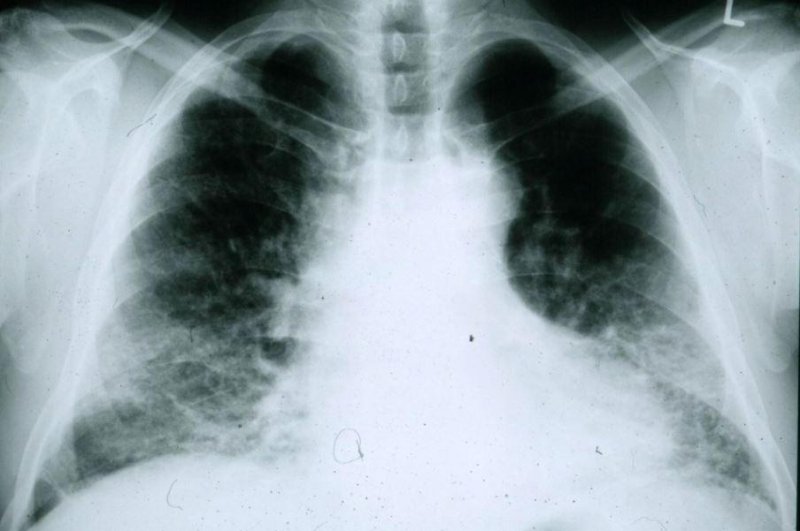This is a chest X-ray of a patient with idiopathic pulmonary fibrosis. Researchers found metformin can reverse the disease in mice. Photo by
IPFedit/Wikimedia Commons
July 3 (UPI) -- Lung fibrosis was reversed in mice using metformin, a drug that has long been used to treat diabetes, according to a new study.
Researchers at the University of Alabama at Birmingham Department of Medicine, led by Drs. Jaroslaw Zmijewski and Victor Thannickal, found the drug targets cell metabolism and could be used to treat the progressive, fatal condition.
About 50,000 new cases of IPF are diagnosed each year in people between 50 and 70 years old, according to the American Lung Association.
There is no effective treatment for the disease.
Researchers used lung tissues from patients with IPF, mouselung fibroblasts and a murine model of lung fibrosis.
Metformin is a low-cost drug, marketed as Glucophage, as well as other names, that was discovered in 1918 for non-insulin-dependent diabetes.
In the new study, published Monday in the journal Nature Medicine, researchers investigated AMP-activated protein kinase, or AMPK, an enzyme that regulates metabolism and senses energy status in the cell. They found that AMPK activity was lower in myofibroblast cells in parts of lung tissue from IPF patients.
As part of the fibrosis process, cells deposit extracellular collagen fiber. They are resistant to the programmed cell death called apoptosis, which removes damaged or aged cells from the body. The researchers found that metformin lowered fibrotic activity and produced new mitochondria -- the organelles in cells that produce energy -- in the myofibroblasts.
In studying mice, they found metformin treatment combined with the anti-cancer drug bleomycin accelerated the well-established fibrosis three weeks after lung injury and continuing for five weeks.
There was no improvement only using metformin.
"Together, our studies support the concept that AMPK may function as a critical metabolic switch in promoting resolution of established fibrosis by shifting the balance from anabolic to catabolic metabolism," the researchers wrote. "Additionally, we provide proof-of-concept that activation of AMPK by metformin or other pharmacologic agents that activate these pro-resolution pathways may be a useful therapeutic strategy for progressive fibrotic disorders."















